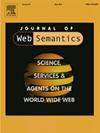Indistinguishability in controlled query evaluation over prioritized description logic ontologies
IF 3.1
3区 计算机科学
Q3 COMPUTER SCIENCE, ARTIFICIAL INTELLIGENCE
引用次数: 0
Abstract
In this paper we study Controlled Query Evaluation (CQE), a declarative approach to privacy-preserving query answering over databases, knowledge bases, and ontologies. CQE is based on the notion of censor, which defines the answers to each query posed to the data/knowledge base. We investigate both semantic and computational properties of CQE in the context of OWL ontologies, and specifically in the description logic , which underpins the OWL 2 QL profile. In our analysis, we focus on semantics of CQE based on censors (called optimal GA censors) that enjoy the so-called indistinguishability property, analyzing the trade-off between maximizing the amount of data disclosed by query answers and minimizing the computational cost of privacy-preserving query answering. We first study the data complexity of skeptical entailment of unions of conjunctive queries under all the optimal GA censors, showing that the computational cost of query answering in this setting is intractable. To overcome this computational issue, we then define a different semantics for CQE centered around the notion of intersection of all the optimal GA censors. We show that query answering over OWL 2 QL ontologies under the new intersection-based semantics for CQE enjoys tractability and is first-order rewritable, i.e. amenable to be implemented through SQL query rewriting techniques and the use of standard relational database systems; on the other hand, this approach shows limitations in terms of amount of data disclosed. To improve this aspect, we add preferences between ontology predicates to the CQE framework, and identify a semantics under which query answering over OWL 2 QL ontologies maintains the same computational properties of the intersection-based approach without preferences.
优先描述逻辑本体控制查询求值的不可区分性
本文研究了受控查询评估(CQE),这是一种基于数据库、知识库和本体的隐私保护查询应答的声明式方法。CQE基于审查器的概念,它定义了向数据/知识库提出的每个查询的答案。我们在OWL本体上下文中研究了CQE的语义和计算特性,特别是在支持owl2 QL配置文件的描述逻辑dl - l中。在我们的分析中,我们关注基于审查器(称为最优GA审查器)的CQE语义,这些审查器享有所谓的不可区分性属性,分析了查询答案披露的数据量最大化与保持隐私的查询回答的计算成本最小化之间的权衡。我们首先研究了所有最优GA审查器下连接查询的怀疑蕴涵的数据复杂度,表明在这种设置下查询应答的计算成本是难以处理的。为了克服这个计算问题,我们然后为CQE定义了一个不同的语义,该语义以所有最优GA审查器的交集概念为中心。我们证明了在新的基于交集语义的CQE的owl2本体上的查询应答具有可追溯性和一阶可重写性,即可以通过SQL查询重写技术和使用标准关系数据库系统来实现;另一方面,这种方法在公开的数据量方面显示出局限性。为了改进这方面,我们在CQE框架中添加了本体谓词之间的首选项,并确定了一种语义,在该语义下,owl2 QL本体上的查询应答在没有首选项的情况下保持了基于交集的方法的相同计算属性。
本文章由计算机程序翻译,如有差异,请以英文原文为准。
求助全文
约1分钟内获得全文
求助全文
来源期刊

Journal of Web Semantics
工程技术-计算机:人工智能
CiteScore
6.20
自引率
12.00%
发文量
22
审稿时长
14.6 weeks
期刊介绍:
The Journal of Web Semantics is an interdisciplinary journal based on research and applications of various subject areas that contribute to the development of a knowledge-intensive and intelligent service Web. These areas include: knowledge technologies, ontology, agents, databases and the semantic grid, obviously disciplines like information retrieval, language technology, human-computer interaction and knowledge discovery are of major relevance as well. All aspects of the Semantic Web development are covered. The publication of large-scale experiments and their analysis is also encouraged to clearly illustrate scenarios and methods that introduce semantics into existing Web interfaces, contents and services. The journal emphasizes the publication of papers that combine theories, methods and experiments from different subject areas in order to deliver innovative semantic methods and applications.
 求助内容:
求助内容: 应助结果提醒方式:
应助结果提醒方式:


